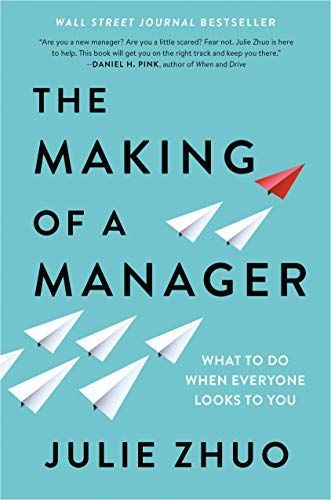
The Making of a Manager What to Do When Everyone Looks to You
Instant Wall Street Journal Bestseller! Congratulations, you're a manager! After you pop the champagne, accept the shiny new title, and step into this thrilling next chapter of your career, the truth descends like a fog: you don't really know what you're doing. That's exactly how Julie Zhuo felt when she became a rookie manager at the age of 25. She stared at a long list of logistics--from hiring to firing, from meeting to messaging, from planning to pitching--and faced a thousand questions and uncertainties. How was she supposed to spin teamwork into value? How could she be a good steward of her reports' careers? What was the secret to leading with confidence in new and unexpected situations? Now, having managed dozens of teams spanning tens to hundreds of people, Julie knows the most important lesson of all: great managers are made, not born. If you care enough to be reading this, then you care enough to be a great manager. The Making of a Manager is a modern field guide packed everyday examples and transformative insights, including: * How to tell a great manager from an average manager (illustrations included) * When you should look past an awkward interview and hire someone anyway * How to build trust with your reports through not being a boss * Where to look when you lose faith and lack the answers Whether you're new to the job, a veteran leader, or looking to be promoted, this is the handbook you need to be the kind of manager you wish you had.
Reviews
Cassandra Tang@tangaroo
Ani Velasquez@aniruokay
Rafael Matsumoto@rafaelmatsumoto
matej yangwao@yangwao
Tuago@iagomr
Keven Wang@kevenwang
Simao Freitas@simao
Irene Alegre@irenealegre
Maria Chekimoglou@mariachek
Lance Willett@lancewillett
Lucas Coelho@coelholucas
Marcel@marcel
Victoria Simansjah@vicky
Xi Hui Teo@xiface
Nadine Ong@deens
Conor O'Driscoll@odrscll
MJ@mikejonesberlin
Gonia Cholewa@coconuthooves
Aske Dørge@aske
Claire Taylor@clairetaylor
Anton Fresher@tonyfresher
Yishan@liyishan
David Gallardo@davidg
Ines Lourenco@hey_nessy
Highlights
Cassandra Tang@tangaroo
Cassandra Tang@tangaroo
Cassandra Tang@tangaroo
Cassandra Tang@tangaroo
Cassandra Tang@tangaroo
Cassandra Tang@tangaroo
Claudine@claudrod
Igor @igorfreirehata
Chris Herrmann@christopheralan
Chris Herrmann@christopheralan
JP Juinio@jpjuinio
Page 232
JP Juinio@jpjuinio
Page 202
JP Juinio@jpjuinio
Page 200
JP Juinio@jpjuinio
Page 130
JP Juinio@jpjuinio
Jonathan Steele@steele
Page 36
Jonathan Steele@steele
Page 35
Jonathan Steele@steele
Page 33
Jonathan Steele@steele
Page 21
Jonathan Steele@steele
Page 19
Jonathan Steele@steele
Page 11